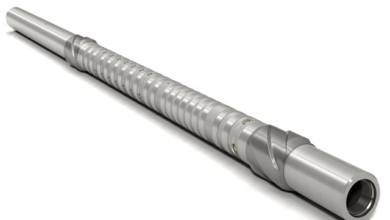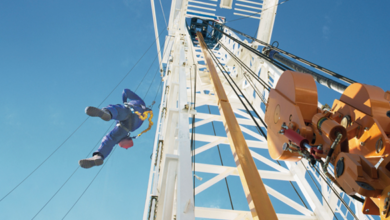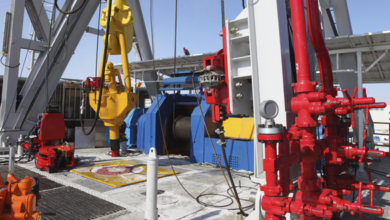Perspectives: On his rigs, don’t just talk about safety. Walk the talk.
Larry Holloway
Going from Louisiana to Tunisia after graduating from Northwestern State University in 1976, Larry Holloway was excited about his first international offshore rig assignment. It wasn’t his first trip offshore – he is a second-generation roughneck as his father, Shelton, was VP operations for Penrod Drilling, and had his first trip offshore with his father when he was only 12 years old. He had also put in consecutive summers on offshore rigs during high school and college, even working his way up to a derrick hand.
Still, it was his first trip abroad. Moreover, his company had provided few details about the trip or even where exactly he was going. After arriving in Africa, Mr Holloway was met by a local Tunisian holding his name on a small sign; however, the gentleman could not speak English. He was then put into a taxi, driven by another local he was unable to communicate with. “At times during that seven- or eight-hour ride through the desert, I thought I might have possibly been kidnapped,” he recalls.
Fortunately, it turns out that he had not been kidnapped but was being taken to meet the local area manager. Yet the story clearly illustrates just how much the industry has improved in the three decades since. Nowadays, employee communication and training is seen as vital to a company’s HSE performance.
“Back then, you were just expected to know how to do things and you had to figure it out on your own. We’ve gotten so much better at teaching and training our people,” Mr Holloway said.
The same goes for safety and the environment, he said. “We’ve changed significantly and made tremendous efforts to have incident-free and environmentally safe operations.”
Take Chevron, for example. Atwood Oceanics’ VICKSBURG jackup, for which Mr Holloway is operations manager, has been drilling for Chevron in the Gulf of Thailand since 2006. The operator’s commitment to safety has been truly impressive, he said.
“They have the same respect for safety as we do at Atwood. They don’t just talk about safety; they walk the talk. They want everything to be done incident-free. If it requires shutting an operation down in order to be incident-free, they’d rather you do that than have anyone get hurt,” he said. “They believe that no one should get hurt, and that makes my job a lot easier.”
A GOOD NAME GOES A LONG WAY
Because he had already built up his rig experience during school, it didn’t take many years for Mr Holloway to work his way up to toolpusher/OIM after that first roughneck assignment in Tunisia. And over the last 32 years, he’s created an impressive resume with Penrod, Chiles Offshore, Noble Drilling and, since 1995, Atwood Oceanics. Areas where he’s worked include Tunisia, Malaysia, Vietnam, Australia, Trinidad, Myanmar, the Philippines, Brazil, Japan, Alaska, Gulf of Mexico, Nigeria and Thailand, to name a few.
“I think I’m well respected by my peers. Operators know who I am, and if I’m running an operation, they want to have the rig I’m looking after,” he said.
Mr Holloway notes that a global career such as his requires not only the flexibility to quickly pick up and move halfway around the world, it also calls for minute attention to cultural differences – which can be sometimes obvious and sometimes subtle. When he brings in new employees from the US or Europe, he makes sure they have some cultural understanding. “They have to understand how to treat people according to a different set of cultural rules. For example, don’t point your finger. Never touch them on the head. Don’t talk loudly because they’ll think you’re being aggressive. It has its challenges.”
In Southeast Asia and Bangkok, Thailand, where Mr Holloway has been based for the past seven years, people tend to be shy and quiet. “It’s difficult sometimes to get them to speak out, and they don’t usually volunteer much information. But they’re very good workers and extremely friendly. People call Thailand the Land of Smiles, and that’s true.”




One Comment